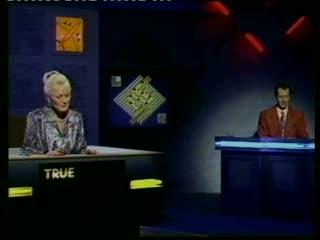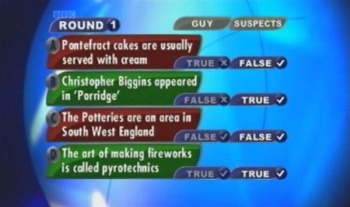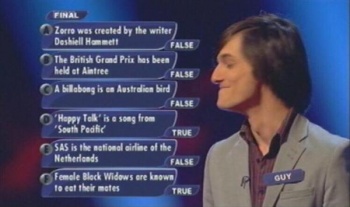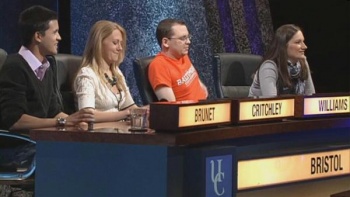Weaver's Week 2011-02-06
Last week | Weaver's Week Index | Next week
Coming up, Jeremy Paxman finds that Charlie Brooker's potty mouth is catching, the big guns come out on Mastermind, and news from Countdown. This is good, but is it perfect?
Contents |
Perfection
12 Yard for BBC2, 4.30 weekdays
Last year, the returning officer at the Gameshow General Election 2010 had to scrutinise all the ballots for fairness, accuracy, and basic credibility. He had to discount a couple of submissions because they'd contained votes for Perfection. "How can anyone possibly vote for a programme that hasn't even aired yet?" was the question asked of the voting public.
Shortly afterwards, it emerged that the entire first series of Perfection was going to have to be thrown away because it had been manifestly unfair, contestants who were meant to be isolated weren't actually isolated. Perry Fripp, the non-resident overlord (well, mezzanine-level deity) of game shows, chortled up his godly sleeve and crossed another item off his to-do list.
The BBC showed faith in Perfection, and remounted the entire exercise. It's fronted by Nick Knowles, who had thirty unscreened episodes to iron out the worst bugs in the programme. Like his other successful quiz show Who Dares Wins, Perfection features a soundproof isolation booth, though unlike Who Dares Wins, there's just the one soundproof booth. And this time, no monitors feeding information to the "isolated" players.
Each show begins with the four players in the pod briefly introducing themselves. "Hello, I'm Kevin, a greengrocer from London, and this is my fourth game." Then there's a random draw to determine which of the players will come out and play. This draw could have been made by a member of the audience – or the previous contestant – grabbing a ball out of a bag. It could have been made by the Random Ball Picking Machine from In It to Win It, but we understand that stardom has gone to its head, and it demanded its own dressing room and a new bowl of Maltesers for each episode. Instead, the draw is made by a computer flashing up names until it decides to stop. We're sure it's random, but it's not as clearly random. As we say from time to time, it's not enough for shows to be fair, they have to be seen to be fair.
Anyway, one of the contestants is out of the pod. They will be the solo player, and the remaining players will stay in the pod for the rest of the game. For no adequately-explored reason, Nick constantly refers to the other players as "the usual suspects". Wha? These people are under suspicion of doing what? Not being lucky in a computerised random dip? And how is this suspicion "usual" when the line-up will change for almost every single game of the series? Perfection has had 30 episodes to get out some of the little niggles, so we must assume that we're alone in seeing this as a niggle.
In round one, the contestant will face four statements, and must say whether they believe the claim to be true or false. They'll have 45 seconds to respond to all four statements, time is represented by a bar ticking down at the bottom of the screen, and by music gradually increasing in tempo and volume. This little bit reminds us of another contest involving time, true-false questions, and music increasing in tempo and volume: the maze round from seminal 1980s daytime quiz Four Square.
During this time, the pod is isolated, and the other contestants can't see the statements or the responses. After giving the four answers, the pod returns to the game, and Nick quickly polls the pod players to see how many they reckon the contestant has got right. From time to time, the contestant will get four responses correct, they will have achieved perfection in the round.
More often than not, the contestant will have got one or more wrong. The pod players are then asked to select the appropriate number of answers to change, in the hope of achieving perfection on their account. Nick will then give the right responses, almost always in order from top to bottom. There's no point in ramping up tension here too far, because that would leave nowhere to go later in the game.
Answers are revealed by turning the statement a different colour. This leads to a plethora of information on screen: there's a statement, a colour, the words "True" and/or "False", and ticks and/or crosses. This is a difficult one to get right: we wonder if it might be best to have the word "True" or "False" appear by the statement, and the contestant responses flip over to reveal a neat tick or a large ugly X.
After the round has completed, we're asked to consider what's going to be in the contestant's final round. Should the contestant have given four correct responses, they'll be allowed to pick two subjects from a list of twelve. These subjects will form statements in the final round. However, if the contestant failed and the pod got four responses right, it's the pod players who pick two subjects, hoping to find holes in their erstwhile companion's knowledge. Should neither side get all four responses right, the holes in the round roll over.
This process repeats across three preliminary rounds, so it's possible that the final round could be played with all six slots on the finals board free. Should there be a failure after the last preliminary round, the contestant and the pod will alternate choices to fill up the board.
So, after about fifteen minutes of quizzing, and a little explanation of some of the more interesting facts from the host, we've reached the final round. Initially, this is very similar to the earlier rounds, except that the contestant is now standing rather than perched on a bar stool. The contender is allowed to see the statements, and determine whether it's true or false. Unlike previous rounds, there's no time limit to form the judgement. Again, the people in the pod are asked how well they think the solo player has done.
This time, there's a difference. If they so choose, a pod player can choose to come out and play with the contender. This will cost money: if the correct responses are on the board after the pod player's emerged, that additional brain will be paid some of the jackpot, and that person and the solo player negotiate as to how much will be paid. Should no additional thought be required, the solo player will scoop it all.
There's one further consideration: if the pod player does come out of the pod, that's it, they won't go back in, and they won't be allowed to play as a solo player. So not only do they have to know they're right, they have to be able to negotiate a sufficiently large payout to make it worth their while. This negotiation is the one element we don't recall from mid-aughts wonder Beg, Borrow or Steal, where dosh was automatically split between the successful contestants.
And that's the game. There's £1000 in the kitty for the first game, and that prize increases by £1000 for each game that isn't won. Each game is complete in 22 minutes – it's almost as if 12 Yard wants to sell this programme to the North American market. Not that there's anything wrong with that.
For this viewer, Perfection is a perfectly good way of spending three-quarters of an hour. It's not something we're making a date of watching, but if we're around at the time, it's a perfectly acceptable way of watching. Perhaps the biggest niggle is how Nick will always complete a round by asking "How did you fare at home?" There are many other ways of saying that he's going to give out the correct answers, might he be able to use more than just this one?
University Challenge
Deci-final 4: Queens' Cambridge v Bristol
Queens' Cambridge has accounted for Balliol Oxford (first time out) and Merton Oxford; Bristol put out St Andrews (who also qualified for the repechage) and Newnham Cambridge. Queens' begin the programme by raising Thumper's hackles, suggesting that Robespierre was a lady. Irish tragedy of the week is "Finnegans Wake", not a portrait of the ITV and Channel 4 chat-show host. Dirac and propaganda help Queens' progress, but Bristol finally crack open the game with the golden mean and other great mathematical constants. Japanese administrative regions are the subject of the first visual round, and that lifts Queens' into a 65-20 lead.
Bristol gets a set of questions on the Canadian territories. They answer "Manitoba" to two of the questions, presumably on the grounds that it's the only Canadian place they've heard of. But Manitoba's a province, halfway between Ontario and Saskatchewan, and can never be right in questions about territories. In their next set of bonuses, Bristol give a pass, even though the correct answer has been discussed in the team. Even the guesses count! And just to complete the errors, the captain repeats part of the question rather than give the answer his team has been discussing. Two schoolboy errors, but it hasn't hurt them too badly so far. Mid-1980s songs called "The Power of Love" form the audio round, and Bristol are ahead by 100-65.
"Bye, metallic", as the crowd said to a disappearing rock act. No! It's the next starter, and Bristol get bonuses about shades of Blue. More on that disappearing rock act later. Queens' get their first starter in yonks with biological homophones, and then get some anadromes in the bonuses – that's words that read as other words when spelled backwards, like "dog" and "god". Smart-arse question of the week asks after the UK dialling code, the atomic number of arsenic, and the length of a cricket pitch: they're multiples of what number? Eleven the answer that eventually springs to mind. Nineteenth century composers immortalised in statues give us the second visual round, and Bristol has extended its lead to 145-80.
Thumper spends some time describing the Cyrillic letters making up a politician's name, but the teams don't wanna put in. Except one does. Five and a half minutes, 80 points the gap, and Queens' need to start a comeback right now. The Paleozoic era gets them back on the scorechart, but they get just one of the bonuses on rhyming schemes. The flag of Bhutan and fullerene molecules help them advance, but a dropped starter runs down the clock a little. Two starters should win it for Bristol, but another opener goes beckoning.
The Order of the Garter is another good answer for Queens', who dredge up "unctuous" from somewhere. Probably a Father Ted episode. Triangular numbers pull Queens' within ten, and words beginning POLL- draws the sides level. Game on!
Two starters in the game, and Queens' kick off with the first starter – the Korean war – and score 15 on bridges. But they score a missignal, but Bristol can't pick up the starter. A myriad being 10,000 gives Queens' another starter, and that's the game. Queens' have won, 190-160. Five starters for Mark Jackson, his side had 19/31 bonuses and three missignals. Lucinda Critchley and Georgia Malcolm both got three starters for Bristol, their bonus rate was 12/30. Overall accuracy was 52/88.
Next match: Oxford Brookes v Sheffield
Countdown Update
University Challenge host Jeremy "Thumper" Paxman hasn't had a good week. He closed down the Newsnight daily email, suggesting it was a load of carp. He's also be snuffering from an outbreak of Enervnation, a tic that caunses sufferers to add the letter "n" spnuriously to words, such as in "cuts". Snerious cases ca result in the letter "" vaishing whe it's actually eeded.
Fortunately, enervation can be cured by playing along with Countdown, and here's what television's healthiest show has been showing this year. January began with Mike Pickering in the champion's chair, he added a third win and scored 318 points in his games. Gavin Cooksley managed only one win (131 points), but that's only because he came up against the juggernaut that was Adam Gillard. The young man from Stanmore won eight games, scored eight centuries, twice exceeded 120 points, and totalled 903 in his run.
Ken Alden followed that, winning once (144) and ceding the win to Jamie Humphries (2 wins, 252). Jody Sparrow beat Jamie in a quality game, and managed two wins on his own bat (254 points). Dave Dyer took over the champion's seat on Monday, and looked set for a long run. It wasn't to be, he lost on Wednesday to Edward McCullagh, but 2 wins and 280 pts is a very good feat. One of the words Mr. Dyer declared was a reference to Jimmy Carr's brother Wayne.
Thumper's never going to cure his pottymouth, is he?
Mastermind
Heat 21
Ann Skillen is waiting on the results of this match, if the runner-up fails to beat her score of 30 points (7 passes), then she's into the semi-finals. Over on BBC1, England are playing Wales at the rugby, and it's worth noting that there's only one Welshman on the show, and he's asking the questions. It's not only in Cardiff where they're pulling out the big guns...
Karen Davies is first into the chair, and she's taking The Avengers and New Avengers TV series (1961-9; 1976-7). The epitome of the Swinging Sixties, The Avengers chronicled the spies John Steed (Patrick McNee), Cathy Gale (Honor Blackman), and Emma Peel (Diana Rigg) as the upper-class Brits saved the world from assassins, saboteurs, pirates, and baskets of fruit with ambitions to take over the solar system. The New Avengers lacked the whimsey of the earlier series, and didn't last as long. This round is a bit like the series: starts well, but ends up in a bit of a pass, finishing on 9 (4).
Ian Bayley is up next, he's taking the Romanov Dynasty 1613-1917 (er...). The death of Ivan the Terrible in 1584 led to a period of uncertainty in Russia; none of the would-be Tsars was good enough, not even Boris of that ilk. Eventually, Michael Romanov assumed the throne of Russia, and his family would reign for just over three centuries. The line includes Peter the Great, Catherine the Great, and Nicholas II, where the line ended. The round has a lot of hits, but the errors are like Rasputin and can't be killed. 11 (0).
There's a bit of an Oxbridge battle: the previous contender is from Oxford, Andrew Smithies from Cambridge will discuss the History of the London Underground (1863-). Originally established by the GWR and GNR as a means to bring wealthy commuters from Paddington to the Farringdon area, the Underground grew and grew into the sprawling subterranean behemoth we now know. It has given rise to arcane challenges and games, such as the utterly incomprehensible "Visit all the stations in one day" challenge, and the childishly simple Mornington Crescent. Lots of starts and stops in this round, very appropriate. 9 (4).
Duncan Mitchell is our nightcap tonight, with Scottish malt whiskies. These would be alcoholic drinks made from the fermented mash of malted barley grain, distilled to remove impurities, and stored in oak casks for a number of years. It's all Greek to us, we know nothing about these drinks, but we do know a score of 11 (2) when we see it.
In a low-scoring week, it looks like Ann Skillen should get her books out for the next round. Karen Davies knows about Brian the snail, the litmus paper, and then sneezes. Oh, shiatsu, good answer. Anyway, the round moves on, the tonic water and ukulele and Stan Laurel ensure the score moves on, coming to rest at an entirely respectable 22 (8).
Andrew Smithies begins with an encore, which just feels wrong. He goes on with the Jamaican bobsleigh team, the Battle of Little Bighorn, the Fugees and MPs for Blackburn. After a promising start, the round begins to slip away from him a little, but the contender regroups and finishes on 19 (9).
Ian Bayley, that's a familiar name. Undefeated in six games of Only Connect as one-third of the Crossworders, and (at least for the next ten days) the reigning Brain of Britain. Yeah, him. Gravity and Palm Sunday and Simone de Bouvoir make the round get off to a good start, and they'll be tugging their ears in Slovenia at being remembered. No-one ever remembers Slovenia! The correct answers continue flowing, though there's a pause while he remembers the lyric to "Dancing Queen" and the location of I'm a Celebrity... Get Me Out of Here! The final score is 28 (0).
28 points is enough to make the repechage board, however many passes. Duncan Mitchell has the Coe-Ovett battle, the fifth city of Wales, the plot of "Gregory's Girl", and the song "Bright Eyes". We did not know that Isaac Newton wanted to value the guinea at 20/8. The score climbs, but there are a fair few errors and passes, so the final is 21 (7).
Which means that Ian Bayley, a university lecturer from Oxford, continues in his ambition to win every clever clogs quiz going. He'll be back when the semi-finals begin ... next month!
This Week And Next
In the Perfection review, we asked if the contestant had won the finale? No, as statement B is true. Quite how they got the cars over Beecher's Brook is lost in the mists of time.
The BBC has announced its representative for the annual Eurovision Song Contest. It's Blue, who were a boy band in the last decade, thus continuing the UK's record of sending washed-up has-beens who will do anything to re-launch their career. They'll be performing a song they wrote for the contest, and the Grate British Public will have no say in what they perform. It's a high-stakes approach by the Beeb; if the result is a bit rubbish, then they'll be criticised for taking the decision away from the people. Still, it's the first time in five years that the Beeb has ever sent a song suitable for the 21st century, and we'll take progress where we can find it. Will The Saturdays need a career boost next year?
BARB ratings for the week to 23 January put Dancing on Ice clearly on top (8.2m plus 660,000 on ITV-HD), followed by In It to Win It (6.2m) and The Magicians (5.4m). The Biggest Loser is in trouble, episode two barely topped 4m viewers, compared with 3.2m for University Challenge. Antiques Road Trip is doing well, 2.5m in its teatime slot.
Got to Dance remains top of the digital channels, with a round million seeing the first show. E4's Tool Academy grew into second place with 685,000, and Pop Idleus on 625,000. Only Connect ended its run with 615,000, and the Come Dine With Me repeats were seen by 605,000. Elsewhere, 370,000 for old HIGNFY on Dave, 325,000 for old Total Wipeout on CBBC, and 450,000 for new Top Model on UKTV Living.
This week, Rick Wakeman makes his debut at Just a Minute returns (Radio 4, 6.30 Monday), and ITV2's hit series Celebrity Juice is back (10pm Thursday). Masterchef New Zealand comes to UKTV Watch (7pm, Sunday – Friday), UKTV Really features an imported version of Tool Academy (9pm Thursday); the UK effort continues (E4, 10pm Monday), and should be reviewed in the next Week. Saturday has Total Wipeout (BBC1, 7pm) going up against Push the Button 2.0 Live (ITV and TV3, 7.20). By then, Ireland will have chosen her representative to help repair the republic's standing in the eyes of the international community. That's The Late Late Show Eurosong Special Inevitably Won by Jedward (RTE1, 9.30 Friday). Be afraid. Be very afraid.
To have Weaver's Week emailed to you on publication day, receive our exclusive TV roundup of the game shows in the week ahead, and chat to other ukgameshows.com readers, sign up to our Yahoo! Group.







